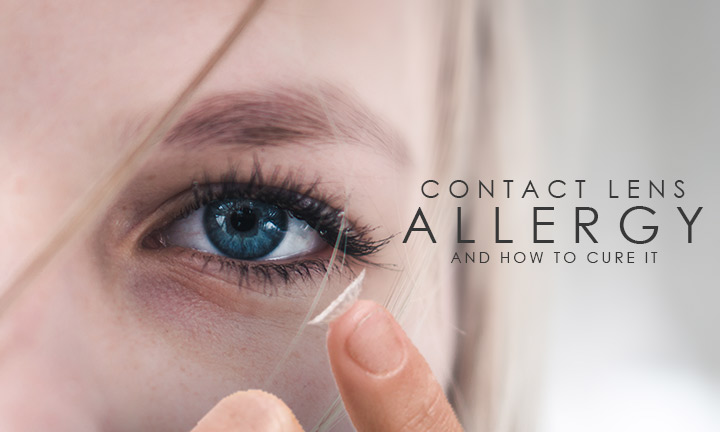6th, March 2019 | Oh Jinna
Contact Lens Allergy and How to Cure it

Eye Allergies

Allergy is one of the top leading chronic condition found in industrialized countries, and contact lens allergy is no exception. It is common among all ages and is also very common for children below 18 years of age.
A lot of people with allergies also have problems with their eyesight and so some of them choose to get contact lenses. Because of this, there is an increasing amount of concerns related to eye allergies and contact lens usage globally.
A study by the Department of Ophthalmology, Silesian University of Medicine, Katowice, Poland shows that around 15% to 20% of people across the world are affected by different forms of allergy.
40% to 60% of these people have ocular symptoms, which concludes that problems linked to eye-related allergy and contact lens use is gradually affecting more people worldwide.
Sometimes, eye allergies may be directly caused by your contact lenses or the solution that you use.
Most eye allergies appear because of environmental or seasonal factors.
You may be allergic to some free-roaming particles in your environment, which can come and go with the season.
However, sometimes, eye allergies may be directly caused by your contact lenses or the solution that you use. Do you think you have contact lens allergy?
If you aren’t sure if you’ve ever had eye allergies, you should know that they feel itchy, uncomfortable, and irritating to your eyes.
And, like common eye problems, most of these symptoms can feel very familiar.
What is Contact Lens Allergy?
If you’re a contact lens user, you probably know how your contacts can make allergies and infections feel a little worse than usual.
The irritation on your eyes, mixed with the contact lenses themselves, can raise the discomfort to a higher level.
However, did you know that your contact lens can also be the main reason for your eye allergies?
Yes, it may come as a shock, but some people are actually allergic to their contact lenses.
Additionally, the solutions of your contact lenses can also be the cause of some allergic reactions.
The importance of careful eye care with contacts
In a very visual world, our eyes play an important role in our lives. And as a contact lens user, you should be very mindful about keeping your eyes’ health in check.
Here are a couple of reminders to help you take better care of your eyes:
- Contact lenses have a tendency to worsen eye infections. And if not treated immediately, this could lead to permanent vision damages or even blindness.
- Irritated eyes can mean a minor allergy or a severe eye problem and the symptoms won’t always be an easy indicator for the level of your condition.
Everyone is prone to eye infections and irritations, so good eye-care habits may not always guarantee you a an irritation-free pass, but it’ll help reduce the chances of your eyes getting hurt.
Remember, you should always keep your contact lenses clean to avoid any unwanted eye allergies or infections. Prevention is always better than cure.
How to know if you have contact lens allergy?
As a contact lens user, you should already be familiar with the feeling of having contacts on, right?
But an allergic reaction while wearing contacts makes the sensation more noticeable.
The more prominent symptoms are swelling and reddening of the eyes. And you may also notice your eyes to be more watery and itchy at the same time.
So how do you fix your contact lens allergy? First, you have to make sure that it’s an allergic reaction.
Next, you can buy over-the-counter eye drops for your allergies.
But if it doesn’t help, then you can get your eyes checked professional, and they’ll likely give you some prescription drops.
Reminders for eye drops:
- You should always read the labels of the eye drops first.
- Follow the instructions properly.
- Determine if it is safe to use the eye drops while wearing contacts.
- You can try a different brand of solution for your contact lenses.
- Always get a professional’s opinion. Eye doctors and other medical professionals are always ready for consultations.
How to treat your irritated eyes
The first thing you should do is to stay away from the cause of irritation. In this case, you should give your eyes a break from your contact lenses.
Get your eyes checked
Your doctor is likely to advise you to stay away from contact lenses for a week or so.
During this stage, you may also want to use some artificial tears to help keep your eyes lubricated.
Having dry eyes can lead to unwanted irritation, so lubrication is the key for cleaner and healthier eyes.
Learn to prevent irritation
Prevention is always better than cure, so it’s important for you to educate yourself with the right preventive measures.
Learn about cleaning regimens for your contact lenses to keep them as clean as possible.
You should also observe and assess your reaction to contact lenses or solutions and try to find out if they are causing any sort of irritation.
Change your lens type
If you feel like your lenses are causing some problems, then it might be the right time to look for new ones.
You contact lenses are always in direct contact with your eyes, so it’s very important that you choose the best quality possible.
Start talking to your doctor about different types of lenses that are safer for your eyes.
Change your solution
You should consider different brands of solution if you feel like your current one is causing your eye problems.
Go to a trusted eye doctor and ask for the best solutions that they can recommend.
Eye Tips
The bottom line is that you should definitely get your eyes checked as soon as your irritation lasts longer than a single day.
You don’t want to make your condition any worse, so whether the discomfort is bearable or not, you should immediately see a doctor.
Keep your eyes healthy
There are plenty of things that you can do to keep your eyes at top shape, such as getting the right amounts of vitamins.
Check this article to find out the 17 most beneficial foods for better eyesight.
Contact lenses can make irritations worse
You should never wear your contact lenses when your eyes are already irritated.
Regardless of what is causing the irritation, wearing your contacts is very likely to make things worse.
Remember, your contact lenses are directly on your eyes, so imagine the extra irritation it can cause.
Always keep a set of spare eyeglasses
You never know when an eye problem might occur, so it’s a good idea to keep a set of eyeglasses just in case.
Make sure that the prescription of your spare eyeglasses are up-to-date to avoid any discomfort when you wear them.
You should make sure that your eyeglass are comfortable because you’ll be wearing them until your eye infection or irritation disappears.
References:
Are You Allergic to Your Contact Lenses or Solution?
Adverse events in allergy sufferers wearing contact lenses
https://www.ncbi.nlm.nih.gov/pmc/articles/PMC4495118/
Could You have an allergy to contacts? How to know and what to do
https://www.woodhamseye.com/blog/could-you-have-an-allergy-to-contacts-how
Contact Lenses: When a Solution Is the Problem
https://www.aao.org/eyenet/article/contact-lenses-when-solution-is-problem

Leave a Reply
You must be logged in to post a comment.